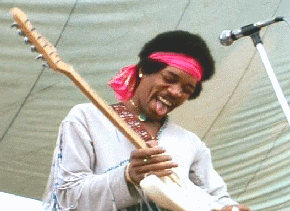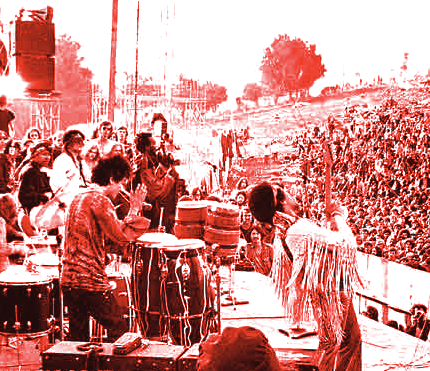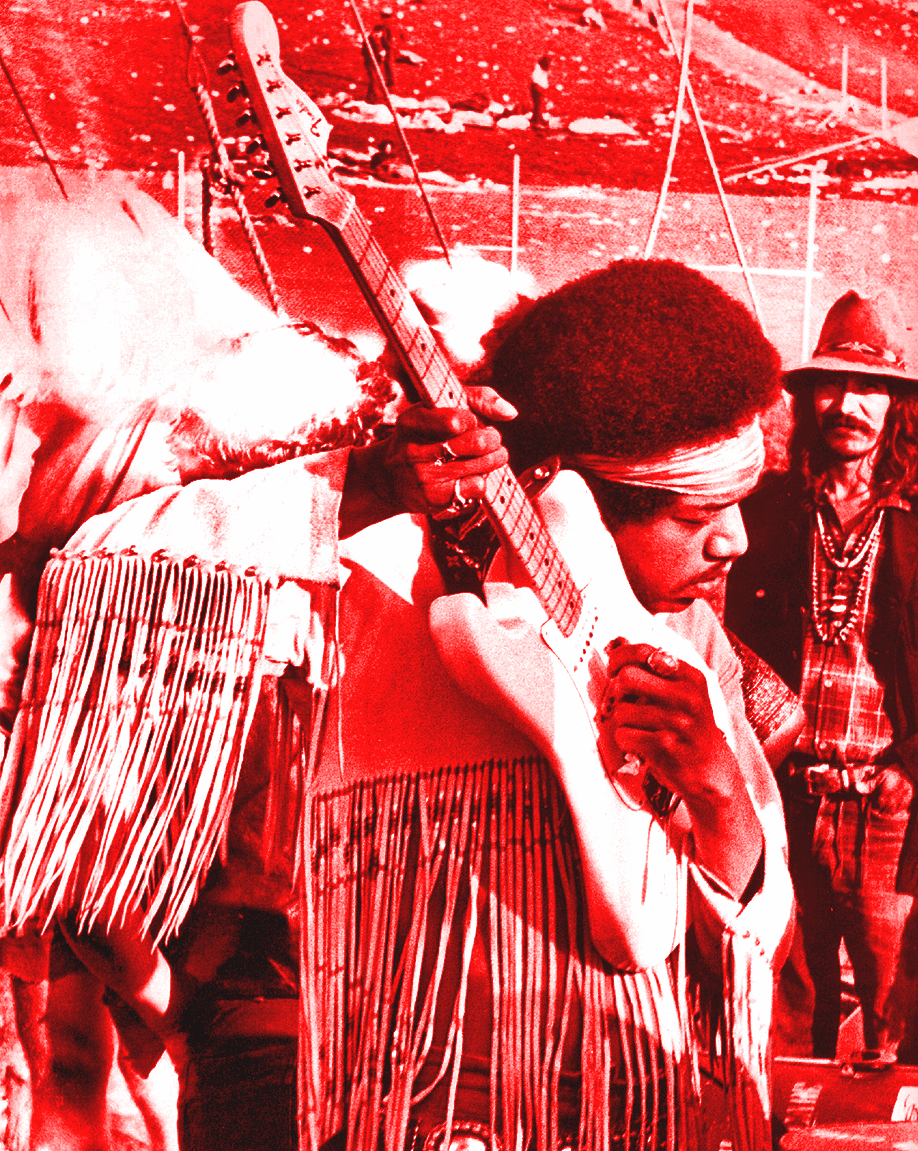 |
  |
 |
published: August 2, "1994"
Jimi Hendrix :Woodstock CD booklet by Michael Fairchild |

Previews & What's New
Jimi's Prediction —
A Remote View About Jimi Hendrix Timeline Blog Asteroid Impact Evolution Woodstock Blues Jimi Code VS. Da Vinci Code Credit Thefts Missile Agency/Moon Base Charade Seattleland Censorship Events Skewed Science Search Engine Rankings Download An Ad AT&T: New Nuremberg The Wall(y)flower Syndrome Rochester Media DVD/CD Store More Links... 
page 5 of 8
The Butterfield Blues Band followed CSNY while Eddie Kramer tried to figure out how he'd get all of Jimi's new band on tape. "I had two eight-track machines," Eddie remembers, "but because of the pulse tone signal required for the film crew, we were only able to utilize seven tracks for recording. One machine was installed in an orange crate and the other in a wooden box. I had a small twelve-input mixer and a bunch of little Shure mixers stacked up beside it. The buzzes, crackles and hum were making me pull my hair out. Hanley's PA system barely worked - it was hung together with bailing wire and chewing gum. Having not been tested prior to the festival, it was finally completed as the concert began."
Sha Na Na appeared next. Drummer Jocko Marcellino remembers, "We finally went on as the sun was coming up Monday. Luckily the camera crew was waking up to shoot Jimi Hendrix, so that immortalized us. We went on with gold lame suits and leather jackets and our hair greased, we were really different from everyone else. This one guy said he woke up and thought he was on some sort of bad acid trip."
 The juxtaposition of Sha Na Na just prior to Jimi's appearance on Monday morning was nearly as weird as seeing the Experience warm up for the Monkees two summers earlier. As Brooklyn-based throwbacks to '50s greaser-rock, Sha Na Na drew a round of boos from thousands who'd endured days of discomfort out of determination to see Jimi. But soon impatience became anticipation as everyone warmed to the first ray of the new rising sun. Melting rainbow watercolors seeped through the sunrise and inspired a new title for Jimi's band. He walked out into the dawn of a Gypsy Sun, with multicolor streaks stretched across the sky. In India, the time of day is an aspect of music. Sound is heard differently through the changing hours. Sitar ragas are composed specifically for morning, afternoon, or evening recital. But rock is mainly music of the night, so much so that Jimi's Woodstock performance stands as the only example of a morning Hendrix rise 'n shine set.
 A blissful afterglow radiated over the site as his Gypsy Sun & Rainbows Band took positions on stage. It wasn't until this moment that history could claim Woodstock as the apex of the decade. All weekend long the festival had teetered at the brink of disaster. No one was prepared to meet the needs of such masses. An underground revolt of Motherfuckers vs. unorganized concessionaires threatened everyone with a food shortage. Torrential rains washed away topsoil and exposed buried electrical cables. Thousands of feet stepped on thinning rubber insulation. The promoters had to risk mass electrocution, or mass riot if the power went out. Lightning and high winds danced around swaying sound towers anchored in mud. Each tower held huge speakers ready to topple on a sea of heads. Limited access to the site meant a potential medical disaster. For the duration, armed troops on standby alert were ready to invade the site at the first sight of trouble. A governor's word would've wrought holocaust. But through it all, only a flimsy security force was present on Yasgur's farm. Woodstock was the first and last time a rock festival happened without massive police presence. And it worked! By Monday everyone knew they'd made it through. It was this blissful mix of relief and success that met Jimi when he greeted those who'd waited.
 "It was a success," said Hendrix, "for the simple fact that it was one of the largest gatherings of people, in a musical sense. It was a complete success compared to all the other festivals. I'd like for everybody to see this type of festival, how everybody mixes together. It spreads harmony and communication. There was no violence at all out there. Nobody could expect this through a mixed group, the idea of non-violence, and the idea of let everybody in free. And the idea of people really listening to music over the sky in such a large body. Everybody thinks that something is gonna go haywire, but that's always brought on by the police." Against many odds Woodstock reached Promised Land status and summed up the spirit of the '60s. It was the closest civilization came to utopia. Billy Cox cites it as, "the most memorable concert. The reason for that was the energy from the crowd itself. They were very energetic and the energy that they were sending up, we were sending back to them. Jimi was at his height and his peak! When we got to the stage we had a full fledged crowd. At the time we were playing there were over 200,000 people there." But drummer Mitch Mitchell described how, "Having waited up all night, the audience understandably seemed as groggy as we were, and it was horrible to see people packing up and leaving as we came on. Monday morning was back to the grind for a lot of people who'd come and it couldn't be helped."
|
| © 1994 First Century Press. All Rights Reserved. Contact Us |
